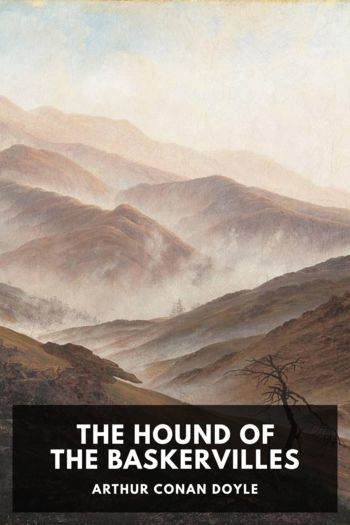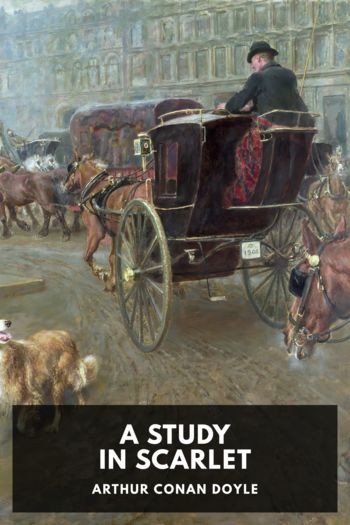The Valley of Fear by Arthur Conan Doyle (best management books of all time .TXT) 📕

- Author: Arthur Conan Doyle
Book online «The Valley of Fear by Arthur Conan Doyle (best management books of all time .TXT) 📕». Author Arthur Conan Doyle
“What about Archie Swindon?” asked a brother.
“He has sold out and left the district. The old devil left a note for us to say that he had rather be a free crossing sweeper in New York than a large mine owner under the power of a ring of blackmailers. By Gar! it was as well that he made a break for it before the note reached us! I guess he won’t show his face in this valley again.”
An elderly, clean-shaved man with a kindly face and a good brow rose from the end of the table which faced the chairman. “Mr. Treasurer,” he asked, “may I ask who has bought the property of this man that we have driven out of the district?”
“Yes, Brother Morris. It has been bought by the State & Merton County Railroad Company.”
“And who bought the mines of Todman and of Lee that came into the market in the same way last year?”
“The same company, Brother Morris.”
“And who bought the ironworks of Manson and of Shuman and of Van Deher and of Atwood, which have all been given up of late?”
“They were all bought by the West Gilmerton General Mining Company.”
“I don’t see, Brother Morris,” said the chairman, “that it matters to us who buys them, since they can’t carry them out of the district.”
“With all respect to you, Eminent Bodymaster, I think it may matter very much to us. This process has been going on now for ten long years. We are gradually driving all the small men out of trade. What is the result? We find in their places great companies like the Railroad or the General Iron, who have their directors in New York or Philadelphia, and care nothing for our threats. We can take it out of their local bosses, but it only means that others will be sent in their stead. And we are making it dangerous for ourselves. The small men could not harm us. They had not the money nor the power. So long as we did not squeeze them too dry, they would stay on under our power. But if these big companies find that we stand between them and their profits, they will spare no pains and no expense to hunt us down and bring us to court.”
There was a hush at these ominous words, and every face darkened as gloomy looks were exchanged. So omnipotent and unchallenged had they been that the very thought that there was possible retribution in the background had been banished from their minds. And yet the idea struck a chill to the most reckless of them.
“It is my advice,” the speaker continued, “that we go easier upon the small men. On the day that they have all been driven out the power of this society will have been broken.”
Unwelcome truths are not popular. There were angry cries as the speaker resumed his seat. McGinty rose with gloom upon his brow.
“Brother Morris,” said he, “you were always a croaker. So long as the members of this lodge stand together there is no power in the United States that can touch them. Sure, have we not tried it often enough in the law courts? I expect the big companies will find it easier to pay than to fight, same as the little companies do. And now, Brethren,” McGinty took off his black velvet cap and his stole as he spoke, “this lodge has finished its business for the evening, save for one small matter which may be mentioned when we are parting. The time has now come for fraternal refreshment and for harmony.”
Strange indeed is human nature. Here were these men, to whom murder was familiar, who again and again had struck down the father of the family, some man against whom they had no personal feeling, without one thought of compunction or of compassion for his weeping wife or helpless children, and yet the tender or pathetic in music could move them to tears. McMurdo had a fine tenor voice, and if he had failed to gain the good will of the lodge before, it could no longer have been withheld after he had thrilled them with “I’m Sitting on the Stile, Mary,” and “On the Banks of Allan Water.”
In his very first night the new recruit had made himself one of the most popular of the brethren, marked already for advancement and high office. There were other qualities needed, however, besides those of good fellowship, to make a worthy Freeman, and of these he was given an example before the evening was over. The whisky bottle had passed round many times, and the men were flushed and ripe for mischief when their Bodymaster rose once more to address them.
“Boys,” said he, “there’s one man in this town that wants trimming up, and it’s for you to see that he gets it. I’m speaking of James Stanger of the Herald. You’ve seen how he’s been opening his mouth against us again?”
There was a murmur of assent, with many a muttered oath. McGinty took a slip of paper from his waistcoat pocket.
“ ‘Law and Order!’ [That’s how he heads it]
‘Reign of Terror in the Coal and Iron District.
‘Twelve years have now elapsed since the first assassinations which proved the existence of a criminal organization in our midst. From that day these outrages have never ceased, until now they have reached a pitch which makes us the opprobrium of the civilized world. Is it for such results as this that our great country welcomes to its bosom the





Comments (0)